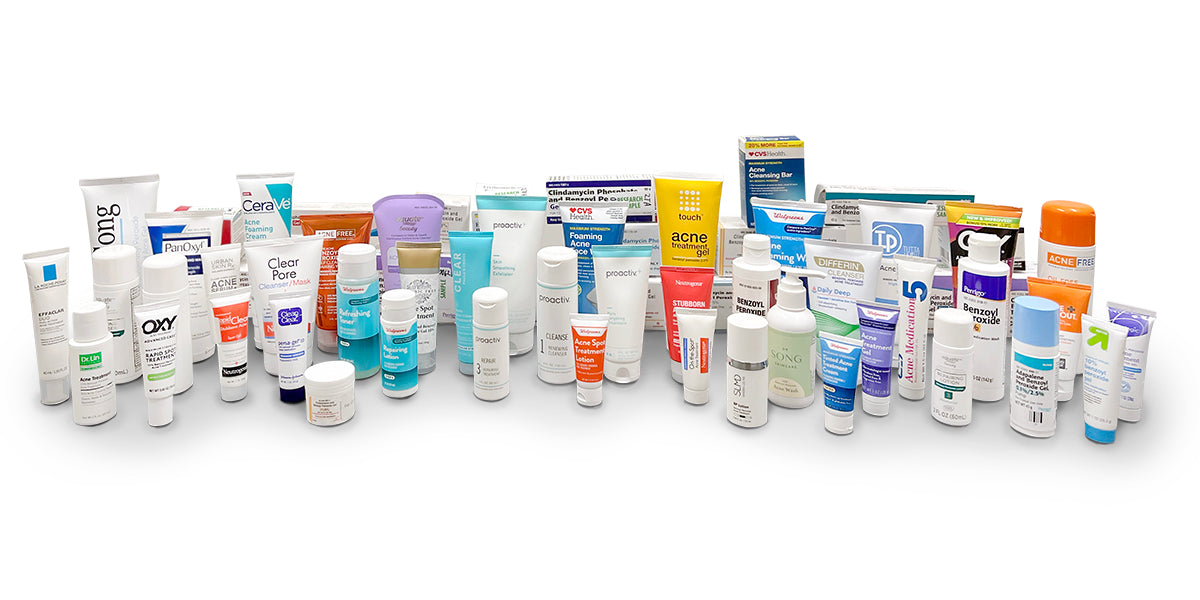
Carcinogenic to Humans: Benzene Found In Benzoyl Peroxide Acne Treatments:Study
Did you hear? Consumers, Dermatologists, and more are shocked to hear that benzoyl peroxide acne treatment products are unstable and also form benzene, a known human carcinogen that poses dangerous health risks!

In our relentless pursuit of flawless skin, the world of skincare and cosmetics has expanded exponentially. However, hidden beneath the promises of radiant complexion lies a darker truth – the potential dangers posed by certain ingredients. Two such substances, benzene and benzoyl peroxide, have come under scrutiny for their harmful effects on skin and overall health in the past few years. In this blog, we will reveal products affected by benzoyl peroxide, why you should be quick to check your cosmetic products for benzene or benzoyl peroxide due its dangerous side effects and also, Valisure's independent test of various acne products.
First, What is Benzene:
Benzene, a colorless liquid with a sweet aroma, has long been associated with industrial processes. However, its infiltration into the realm of cosmetics is alarming. Benzene is a known carcinogen, meaning it has the potential to cause cancer in living tissues. Its presence in skincare products raises concerns about prolonged exposure and its implications for skin health.
The primary risk of benzene lies in its ability to penetrate the skin, leading to systemic absorption. Once absorbed, benzene can enter the bloodstream and travel to various organs, exerting toxic effects on the body. Regular exposure to benzene has been linked to a heightened risk of leukemia, a type of blood cancer that can be fatal.
Furthermore, benzene is notorious for its role in disrupting the normal functioning of bone marrow, where blood cells are produced. This interference can lead to anemia, weakened immune function, and a range of other health issues, making it a concerning addition to any skincare routine.
BREAKING NEWS:
In a test recently conducted by an independent testing laboratory, Valisure LLC, benzene was found in various acne products.
“Valisure performed initial GC-MS analysis on 175 acne treatment products, 99 containing benzoyl peroxide (BPO) and 76 containing other ingredients, most commonly salicylic acid or adapalene. All 76 non-BPO products had no detectable benzene or values below 2 ppm, and 94 of 99 BPO products contained benzene without any elevated temperature incubation.” 1
According to the lab, the amount of benzene found in the products were up to 12 times the amount permitted in guidelines issued by the Food and Drug Administration — an “unacceptably high” level of the carcinogen which has been linked to numerous negative health conditions. 2
Another important takeaway from the study also shows the importance of keeping our cosmetic in regulated temperatures and not to allow products to reach elevated temperatures. As part of the study, it was also revealed that dozens of parts per million (ppm) of benzene can form in just a few weeks at 37°C, hundreds of ppm at 50°C, and at 70°C the apparent degradation of BPO would often lead product packaging to burst. For context, benzene is restricted to 2 ppm for circumstances such that "if their use is unavoidable to produce a drug product with a significant therapeutic advance, then their levels should be restricted. 1
In addition to the acne related treatment products conducted in the study, you might recall that other cosmetic products were affected by levels of benzene found in products.
Summer 2022: Banana Boat announced it was recalling 3 batches of its “hair and scalp” sunscreen after tests found it contained trace amounts of benzene. 2
Shortly later, 24 popular dry shampoo aerosol products sold by Unilever were recalled for “potentially elevated levels of benzene.” 2
However, a key distinction between the acne related products tested vs other consumer cosmetic products was that “The benzene we found in sunscreens and other consumer products were impurities that came from contaminated ingredients; however, the benzene in benzoyl peroxide products is coming from the benzoyl peroxide itself,” said Valisure co-founder and President David Light.

"VALISURE DISCOVERS BENZOYL PEROXIDE ACNE TREATMENT PRODUCTS ARE UNSTABLE AND FORM BENZENE." New Haven, CT. Accessed March 6, 2024.
Reported products that are affected:
- Proactiv 2.5% BPO cream
- Up & Up 2.5% BPO Cream
- Walgreens 10% BPO bar
- Harris 10% BPO wash
- Clinique 2.5% BPO cream
- Clearasil 10% BPO cream
- La Roche-Posay 5.5% BPO cream
- PanOxyl 10% BPO cream
- Sandra Lee MD 2.5% BPO lotion
- Oxy 10% BPO cream
- Galderma 5% BPO cream
- Equate 10% BPO cream
- Differin 5% BPO cream
- CeraVe 4% BPO cream
- Sandoz 5% BPO gel
- TARO 2.5% BPO gel
- Neutrogena 10% BPO gel
- and more 3
Conclusion:
These findings by Valisure LLC in their recent test on acne related treatment products show the emphasis and overwhelming need for independent quality testing for treatment related products. For perspective, Benzene is classified as a Class 1 solvent or carcinogen alongside other known substances such as absestos and lead. 4
It is concerning that an ingredient with such clear harmful ramifications against its users were present in products used by so many people. Included in Valisure's citzen petition to the FDA, includes the consideration to clarify that there is no acceptable level of benzene in cosmetic products and to define a reasonable detection limit. With what we know now, common sense would urge us to first, check our acne related treatment products for the ingredient Benzoyl Peroxide (BPO) and second, immediately cease any use of products found to have been contaminated with or contain Benzoyl Peroxide. While Valisure is recommending for the recall of products found to have Benzene in its study, it is up to you to make the best judgement for yourself.
Read Valisure's condensed news report on their study and findings
Sources:
1: “VALISURE Detects Benzene in Benzoyl Peroxide.” Valisure, 6 Mar. 2024, www.valisure.com/valisure-newsroom/valisure-detects-benzene-in-benzoyl-peroxide.
2: Zilber, Ariel. "Acne creams including Clinique, Proactiv and Clearasil contain chemical linked to cancer: study." NY Post, 6 Mar. 2024, www.https://nypost.com/2024/03/06/business/acne-creams-proactiv-clearasil-have-chemical-linked-to-cancer-study/.
3: "Valisure Citizen Petition on Benzene in Benzoyl Peroxide Drug Products." Valisure, 5 Mar. 2024, https://assets-global.website-files.com/6215052733f8bb8fea016220/65e8560962ed23f744902a7b_Valisure%20Citizen%20Petition%20on%20Benzene%20in%20Benzoyl%20Peroxide%20Drug%20Products.pdf.
4: "Benzene and Cancer Risk." American Cancer Society, 21 Feb. 2023, www.cancer.org/cancer/risk-prevention/chemicals/benzene.html#:~:text=IARC%20classifies%20benzene%20as%20%E2%80%9Ccarcinogenic,%2C%20and%20non%2DHodgkin%20lymphoma.

Leave a comment